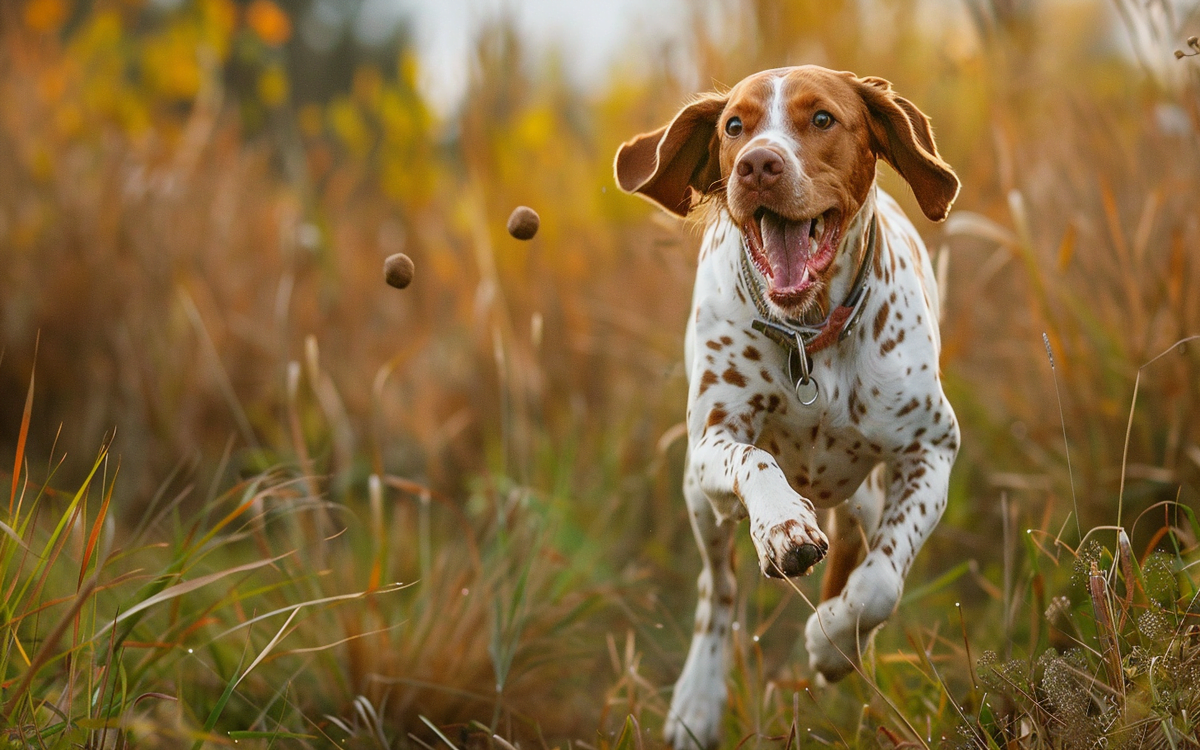Hunting dogs are characterized by their energy, vivacity, and intelligence. Bred for enduring long hours outdoors, these dogs are typically trained in tracking, hunting, capturing, or retrieving game. Whether you own a hunting dog during the off-season or have one as a pet, such breeds require extensive stimulation.
Alongside physical exercise, it’s crucial to find methods to keep your four-legged hunter mentally engaged and active.
Introduction
Calling All Hunting Dogs: Playtime Isn’t Optional, It’s Essential!
Did you know that your trusty hunting companion – the one with the wiggly tail and the nose that’s always on a mission – craves more than just a good hunt? It’s true! Hunting breeds are like bundles of focused energy, and playtime is the key to a happy, healthy, and well-rounded dog.
Think of those hunting instincts that set your dog apart – the drive to track, retrieve, and point. Games are like a fun-filled workout session for their mind and body, keeping those incredible skills sharp even when hunting season is over. Plus, who doesn’t love seeing that goofy grin spread across your dog’s face when they’re having a blast?
Why Playtime Matters (and How to Tell if Your Dog Needs More)
Mental Stimulation: Hunting breeds are intelligent. If they get bored, they might start “hunting” for trouble around the house – like chewing on your favorite shoes or digging a tunnel in the backyard! Games keep them challenged and satisfied.
- Physical Fitness: Hunting dogs are built for action. Playtime helps them burn energy, stay fit, and maintain a healthy weight.
- Stronger Bond: Playing together strengthens that special connection. It’s quality time for both of you!
- Behavioral Benefits: A tired dog is a happy dog. Games can help reduce anxiety, barking, and those mischievous tendencies.
Choosing the Right Playtime Adventure for Your Hunting Dog
Now, not all games are created equal. The best games tap into your dog’s natural instincts and match their abilities. Think about:
- Breed and Job: A pointer probably won’t be as excited about fetching as a retriever, and vice versa. We’ll cover games for different types throughout!
- Age and Energy level: A playful puppy needs different challenges than a seasoned hunting veteran!
- Available space: Don’t have a massive backyard? Don’t worry, indoor games can be just as fun.
Understanding the Science of Play for Hunting Dogs
It’s All in the Brain: How Playtime Keeps Your Dog Sharp
You wouldn’t expect an athlete to train only during the season, right? It’s the same for your hunting dog! Games are like brain workouts, keeping their problem-solving skills honed and preventing boredom from setting in.
Here’s a bit of science for you: When a dog plays, it activates areas of their brain responsible for things like learning, memory, and decision-making. This keeps their minds agile and ready for whatever comes their way in the field. Plus, play can even stimulate the growth of new brain cells – how cool is that?
The Emotional Benefits of Play
Playtime isn’t just about having fun (although that’s pretty important!). Dogs, like us, can experience stress and anxiety. Games offer a healthy outlet for releasing pent-up energy and reducing those negative feelings.
Ever noticed how your dog seems completely relaxed and content after a good play session? There’s a reason for that! Physical activity and mental stimulation during play trigger the release of feel-good chemicals like dopamine and endorphins – nature’s own mood boosters.
Playtime Strengthens Your Bond
Playing together isn’t just about passing the time; it’s about building a deep connection with your furry best friend. Shared experiences create trust and a sense of teamwork, which will only make your hunting adventures even better.
Think of it like this: your dog learns to look to you for guidance, fun, and excitement. As you celebrate their successes during play, you become their biggest cheerleader, and that’s a bond nothing can break.
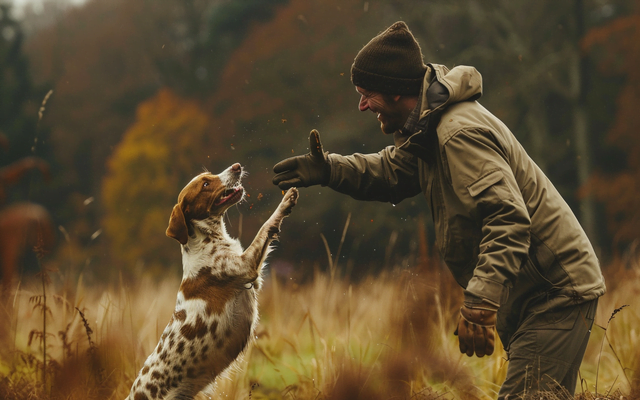
Choosing the Right Games for Your Hunting Dog
The Key to Finding the Perfect Game
Selecting the right games is like finding the perfect pair of boots for hunting – you need the right fit! Consider these factors when choosing what to play:
- Breed and Specialties: This is huge! Here’s a quick and dirty breakdown to get us started:
- Retrievers (Labs, Goldens): Fetch, anything with water, scent work.
- Pointers (German Shorthaired, English Setters): Hide-and-seek, tracking, games focusing on locating.
- Hounds (Beagles, Bloodhounds): Nosework, scent trails, tracking.
- Spaniels (English Springer, Cocker): Flushing birds, fetch, agility-type exercises.
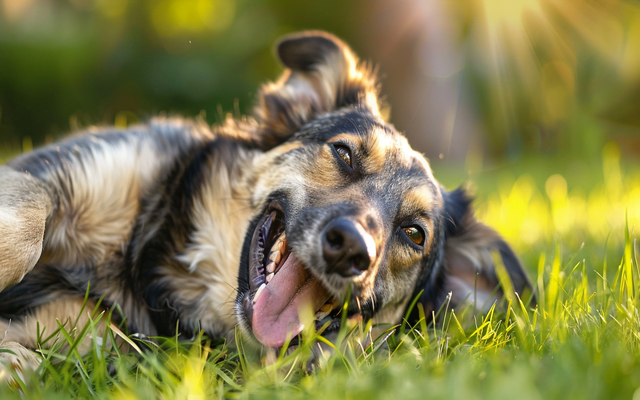
- Age and Energy Level: A puppy will need shorter, simpler games than a dog in their prime. Likewise, adjust the intensity for older, less active dogs.
- Skillset: Does your dog excel at certain tasks? Play games that capitalize on their strengths!
- Available Space and Equipment: Big backyard? Go wild! Limited space? Indoor games can be just as enriching. Adjust what you play based on what you have.
Safety First: Keeping Playtime Fun and Injury-Free
Before we dive into specific games, a quick safety reminder:
- Supervise Play: Keep an eye out, especially with new games. You can spot potential hazards and step in if play gets too rough.
- Choose Safe Toys: Avoid toys with small parts that could be choking hazards. Opt for durable, dog-specific toys.
- Warm Up and Cool Down: Like an athlete, a few minutes of chasing a ball to warm up muscles and a brisk walk afterward can prevent injuries.
- Know Your Dog’s Limits: If your dog seems tired or in pain, stop playtime.
- Breed Considerations: Games with high impact could be risky for breeds prone to joint problems. Consult your vet if you’re unsure.
Popular Games for Hunting Dogs
The Classics
Fetch: Oldie but goodie! Spice it up with:
- Land Fetch: Toss into tall grass, up hills, or mix up retrieves with different objects (toys, bumpers).
- Water Fetch: For water-loving breeds, add a fun challenge with lake or beach retrieves.
- Scent Fetch: Hide a toy with a strong scent, teaching your dog to use their nose to find it.
- Hide-and-Seek: You or a favorite toy hides, encouraging your dog to search. Start simple, then hide in tougher locations.
- The Cup Game: Treats under cups! Your dog sniffs out which cup hides the goodies.
Unleash Their Inner Hunter
- Scent Tracking: Create scent trails using treats or a favorite toy. Gradually increase the difficulty and length.
- Lure Coursing: Simulates chasing prey – great for sighthounds (or any breed that loves to run!).
- Obstacle Courses: Weave poles, tunnels, jumps, etc. Include elements that mimic real hunting challenges.
Indoor Adventures
Don’t let bad weather stop the fun!
- Puzzle Toys: Mentally stimulating toys that require your dog to work for treats or food.
- Nosework Games: Practice scent detection with increasingly challenging searches.
Always start with simple versions of these games. Gradually increase difficulty as your dog masters each level!
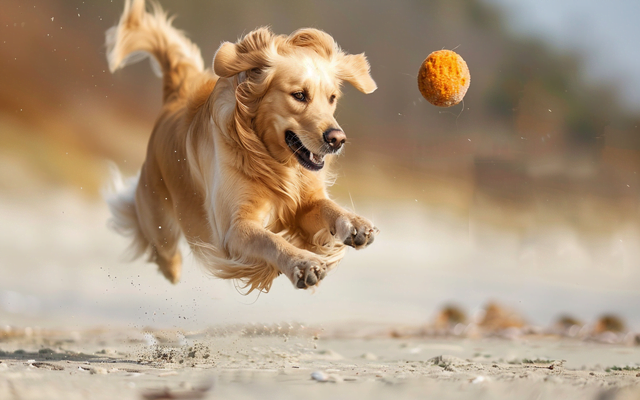
Advanced Games for the Discerning Hunting Dog
Your hunting dog has mastered fetch, hide-and-seek, and scent trails? It’s time to level up with some seriously challenging (and fun!) mind-bending games.
Complex Scent Challenges
- Multiple Distractions: Introduce distractions during scent trails, like crossing other trails or hiding the item near strong-smelling objects.
- Scent Discrimination: Have your dog differentiate between the scent of different game birds or objects using swabs of scent.
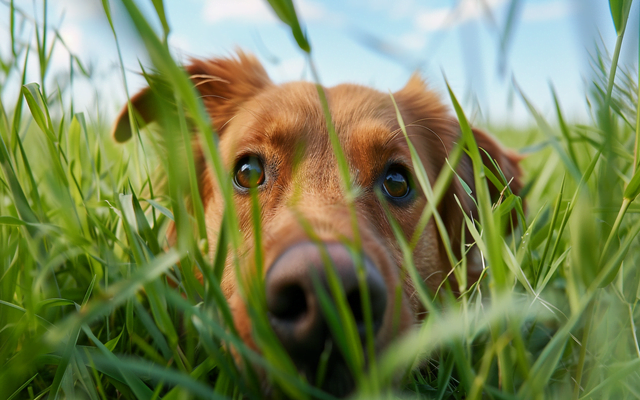
Puzzle Masters
- Commercial Puzzle Toys: Invest in more complex, multi-step puzzle toys or feeders requiring problem-solving skills.
- DIY Puzzles: Create puzzle challenges out of everyday objects like cardboard boxes, muffin tins, or plastic bottles.
Water Work Variations
- Paddleboard Fetch: For experienced water dogs, toss a toy from a paddleboard and have them retrieve. Requires balance and advanced retrieving skills.
- Floating Line Retrieval: Attach toys to long floating lines – your dog has to swim out and haul back their trophy!
Introduce advanced variations gradually. Positive reinforcement is key! If your dog seems frustrated, take a step back to a simpler version of the game.
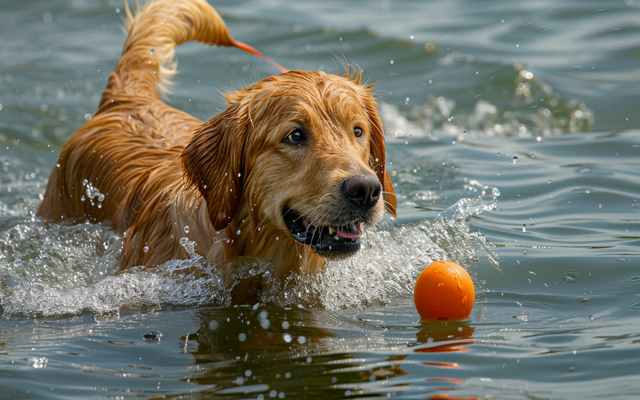
Additional Tips for Maximizing Playtime
Let’s make sure you and your furry companion get the most out of playtime! Here are some handy tips:
- Short and Sweet Sessions: Especially for puppies or when learning new games, keep sessions brief and focused. This prevents frustration and keeps your dog eager for more.
- The Power of Rewards: Don’t just throw a ball and call it a day! Use tasty treats, enthusiastic praise, and belly rubs to let your dog know they’re doing awesome.
- Read Your Dog: Pay attention to body language. Tails wagging, ears perked, and bright eyes usually mean they’re loving it! A drooping tail or yawning could mean it’s time for a break.
- Switch it Up: Variety keeps things exciting! Rotate toys, change playtime locations, and introduce new games regularly.
- Training Time: Incorporate elements of obedience training into play – like teaching ‘stay’ before a fetch or working on ‘leave it’ during scent work.
- End on a High Note: Always try to end a play session before your dog gets completely tired out. This will leave them wanting more and excited for the next time!
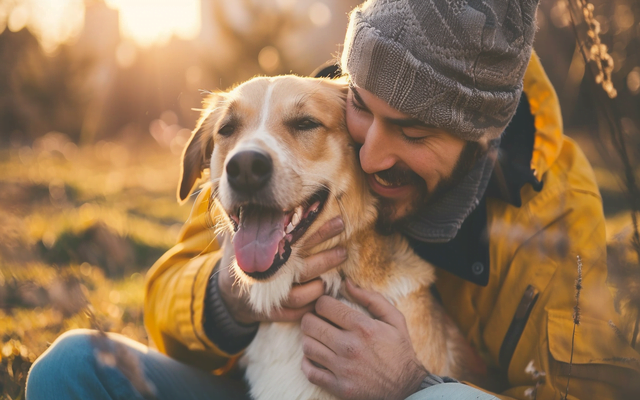
Conclusion
Playtime isn’t just about having a good time (although that’s super important). It’s about nurturing both your dog’s mind and body, strengthening your unique bond, and keeping those hunting instincts sharp year-round.
So grab some toys, set aside some time, and let the good times roll! Remember, the possibilities are endless. Get creative, experiment with different games, and above all, have fun with your furry hunting partner.
FAQs
How do I know if my hunting dog is getting enough playtime?
Look out for these signs:
- Positive Signals: Alertness, enthusiasm for training/walks, relaxed demeanor, generally good behavior
- Needs More Play: Restlessness, excessive barking, destructive tendencies, difficulty focusing
Can I use games to help train my hunting dog?
Absolutely! Games are perfect for reinforcing obedience commands in a fun way. They also help develop focus and teach specific hunting skills. Try incorporating:
- Controlled fetch with “sit” and “stay” before release
- Scent trails leading to hidden training dummies
- Short “tracking” sessions with a favorite toy
What are the best indoor games for hunting dogs when the weather is bad?
Keep their minds sharp! Try:
- Puzzle toys and feeders
- Hide-and-seek (with you or a favorite toy)
- Scent work – practice finding treats hidden around the house.
Can I adapt everyday games like tug-of-war to be more beneficial for my hunting dog?
Yes! Controlled tug-of-war with intentional start/stop commands builds drive and focus. Use it as a training reward rather than a free-for-all playtime activity.
My hunting dog gets destructive when bored at home. Can games help with those behaviors?
Definitely! Bored hunting dogs need mental and physical stimulation. Games that mimic hunting tasks or provide problem-solving challenges can significantly reduce boredom-related destructive behaviors.
Are there certain games that are better for older hunting dogs?
Yes! As your dog ages, adjust playtime to match their energy levels and physical abilities. Focus on:
- Low-impact activities: Scent work, hide-and-seek with large, easy-to-find objects, short fetch sessions on soft surfaces.
- Mental stimulation: Puzzle toys, learning new tricks, practicing known commands.
- Gentle exercise: Slow-paced walks or supervised swimming (if your dog enjoys water).
How can I incorporate hunting-specific skills into playtime, even if we don’t hunt often?
Get creative! Here’s how to keep their instincts sharp:
- Scent trails: Hide training dummies, toys, or even treats. Start with short, simple trails and gradually increase difficulty.
- Focused retrieves: Practice controlled retrieves with various objects (toys, bumpers) to simulate retrieving game.
- Lure coursing: Recreate chasing prey with a lure or flirt pole. Find open spaces and adapt the speed for your dog’s abilities.

I’m Ashley Fowler and dogs have always been my companions from my earliest memories. Growing up, our family dog was my confidant, adventure buddy and sometimes partner in crime (sorry mom, about the chewed shoes!). That bond sparked a lifelong passion for learning about dogs – their unique personalities, their histories, and the special ways they fit into our lives. MDogsW is my way of sharing that passion and hopefully helping others experience the joy of finding their perfect puppy. When I’m not researching dog breeds, you can usually find me hiking with my trusty Beagle by my side or curled up with a cozy blanket, a cup of tea, and a stack of dog breed books.

